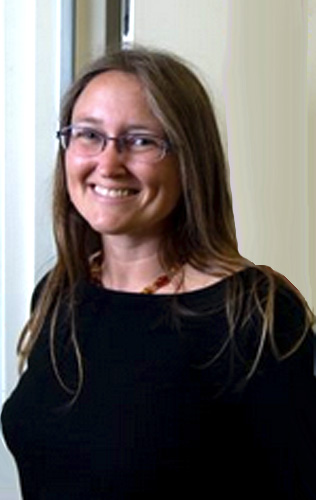Katrine L. Whiteson, PhD is a biochemist interested in human associated microbial and viral communities. She uses metagenomics, metabolomics, microbial genetics and ecological statistics to answer questions about how microbes and viruses affect human health.
She aims to understand how individual and persistent human-associated microbial and viral communities affect health. Infection with a bacterial pathogen, vaccination, immune development and even taking a Tylenol does not occur in a vacuum. Dynamic microbial and viral communities constantly inhabit our bodies, encoding the majority of the unique genes that alter these processes. Resident microbial and viral community composition is unique to each human.
Specifically, she works to understand the role of persistent microbial colonization in triggering inflammatory episodes in Cystic Fibrosis patients. Understanding microbial interactions and changes in microbial physiology that are associated with changes in patient status may lead to the development of biomarkers to diagnose changes in infection earlier and more specifically.
She is also interested in how phage shape dynamic host-associated microbial communities, and in characterizing the function of the 70% of phage encoded genes with no known function.

KATRINE L. WHITESON, PHD
Associate Professor, Molecular Biology and Biochemistry School of Biological Sciences
Associate Director, UCI Microbiome Initiative
Associate Director, UCI Microbiome Initiative
Abstract
"High-Fiber, Whole-Food Dietary Intervention Alters the Human Gut Microbiome but Not Fecal Short-Chain Fatty Acids"
Dietary shifts can have a direct impact on the gut microbiome by preferentially selecting for microbes capable of utilizing the various dietary nutrients. The intake of dietary fiber has decreased precipitously in the last century, while consumption of processed foods has increased.
Fiber, or microbiota-accessible carbohydrates (MACs), persist in the digestive tract and can be metabolized by specific bacteria encoding fiber-degrading enzymes. The digestion of MACs results in the accumulation of short-chain fatty acids (SCFAs) and other metabolic by-products that are critical to human health.
A 2-week dietary fiber intervention was implemented, aiming for 40 to 50 g of fiber per day within the context of a course-based undergraduate research experience (CURE) (n = 20).
By coupling shotgun metagenomic sequencing and targeted gas chromatography-mass spectrometry (GC-MS), the dietary intervention significantly altered the composition of individual gut microbiomes, accounting for 8.3% of the longitudinal variability within subjects.
Notably, microbial taxa that increased in relative abundance as a result of the diet change included known MAC degraders (i.e., Bifidobacterium and Lactobacillus).
Genetic diversity within Bifidobacterium was assessed, assayed by amplification of the groEL gene. Concomitant with microbial composition changes, this showed an increase in the abundance of genes involved in inositol degradation. Despite these changes in gut microbiome composition, a consistent shift in SCFA abundance was not detected.
Collectively, results demonstrate that on a short-term timescale of 2 weeks, increased fiber intake can induce compositional changes of the gut microbiome, including an increase in MAC-degrading bacteria.
Importance:
A profound decrease in the consumption of dietary fiber in many parts of the world in the last century may be associated with the increasing prevalence of type II diabetes, colon cancer, and other health problems.
A typical U.S. diet includes about ∼15 g of fiber per day, far less fiber than the daily recommended allowance. Changes in dietary fiber intake affect human health not only through the uptake of nutrients directly but also indirectly through changes in the microbial community and their associated metabolism.
A 2-week diet intervention in healthy young adults investigated the impact of fiber consumption on the gut microbiome. Participants increased their average fiber consumption by 25 g/day on average for 2 weeks.
The high-fiber diet intervention altered the gut microbiome of the study participants, including increases in known fiber-degrading microbes, such as Bifidobacterium and Lactobacillus.
Fiber, or microbiota-accessible carbohydrates (MACs), persist in the digestive tract and can be metabolized by specific bacteria encoding fiber-degrading enzymes. The digestion of MACs results in the accumulation of short-chain fatty acids (SCFAs) and other metabolic by-products that are critical to human health.
A 2-week dietary fiber intervention was implemented, aiming for 40 to 50 g of fiber per day within the context of a course-based undergraduate research experience (CURE) (n = 20).
By coupling shotgun metagenomic sequencing and targeted gas chromatography-mass spectrometry (GC-MS), the dietary intervention significantly altered the composition of individual gut microbiomes, accounting for 8.3% of the longitudinal variability within subjects.
Notably, microbial taxa that increased in relative abundance as a result of the diet change included known MAC degraders (i.e., Bifidobacterium and Lactobacillus).
Genetic diversity within Bifidobacterium was assessed, assayed by amplification of the groEL gene. Concomitant with microbial composition changes, this showed an increase in the abundance of genes involved in inositol degradation. Despite these changes in gut microbiome composition, a consistent shift in SCFA abundance was not detected.
Collectively, results demonstrate that on a short-term timescale of 2 weeks, increased fiber intake can induce compositional changes of the gut microbiome, including an increase in MAC-degrading bacteria.
Importance:
A profound decrease in the consumption of dietary fiber in many parts of the world in the last century may be associated with the increasing prevalence of type II diabetes, colon cancer, and other health problems.
A typical U.S. diet includes about ∼15 g of fiber per day, far less fiber than the daily recommended allowance. Changes in dietary fiber intake affect human health not only through the uptake of nutrients directly but also indirectly through changes in the microbial community and their associated metabolism.
A 2-week diet intervention in healthy young adults investigated the impact of fiber consumption on the gut microbiome. Participants increased their average fiber consumption by 25 g/day on average for 2 weeks.
The high-fiber diet intervention altered the gut microbiome of the study participants, including increases in known fiber-degrading microbes, such as Bifidobacterium and Lactobacillus.

